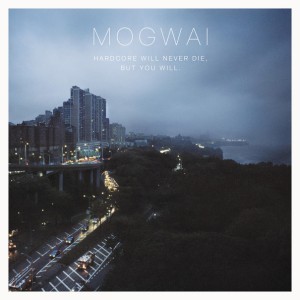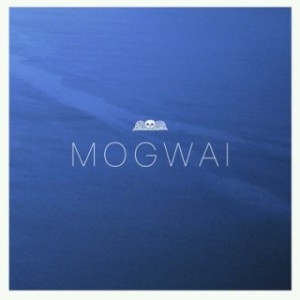|
Welcome to the last official part of Mogwai Discographied. This entry covers their two newest releases: the 2011 album Hardcore Will Never Die, But You Will and the accompanying Home Demos EP. If you'd like to catch up, part one covers Ten Rapid and the 4 Satin EP, part two covers Young Team and Kicking a Dead Pig / Mogwai Fear Satan Remixes, part three covers the No Education = No Future (Fuck the Curfew) EP and Come on Die Young, part four covers the Mogwai EP and their entry in the Travels in Constants series, part five covers Rock Action and My Father My King, part six covers Happy Songs for Happy People and Government Commissions: BBC Sessions 1996-2003, part seven covers Mr. Beast, the singles for Friend of the Night, and Travel Is Dangerous, and the soundtrack for Zidane: A 21st Century Portrait, and part eight covers The Hawk Is Howling, the Batcat EP, and their live album Special Moves. Next time I'll wrap things up with album rankings and ephemera.

Hardcore Will Never Die, But You Will – Sub Pop, 2011
Highlights: “You’re Lionel Ritchie,” “Mexican Grand Prix,” “How to Be a Werewolf,” “Music for a Forgotten Future (The Singing Mountain)”
Low Points: “Rano Pano,” “White Noise”
Overall: Want to know why it’s so difficult to write about every Mogwai release? They’re too consistent. My least favorite of their full-lengths to date (Come on Die Young and Happy Songs for Happy People) are still good records in the grand scheme of things. Put those records against other post-rock records released in 1999 and 2003 and they’ll hold their own. Upon release, I’ve spun each Mogwai album countless times. They’re approachable, solid records. Barring unreasonable hype or the endless hope for a new “Mogwai Fear Satan,” you know what to expect and you get it.
In a large enough sample set, however, such predictability is exhausting. Aside from Kicking a Dead Pig / Mogwai Fear Satan Remixes, I can’t cite a single Mogwai release with a disastrous turn. The best I can do is nitpick: Come on Die Young drags in the middle; Happy Songs for Happy People and Mr. Beast lack transcendent highlights; Zidane is repetitive; “The Sun Smells Too Loud” doesn’t fit The Hawk Is Howling’s mood. Nitpicking is tedious. But that’s what you can do with a body of work that offers a consistent return by taking few risks.
I was spoiled, in a weird way, by the risks taken by Discographied’s first subject, Sonic Youth. Say what you will about NYC Ghosts & Flowers, but it’s not a retread of A Thousand Leaves. I didn’t care for The Eternal, but damned if it’s not a 180 from Rather Ripped. Each Sonic Youth record changed my perception of the group. I may have hated particular songs or releases, but they each offered something new to hear and write about.
Mogwai’s changed from album to album, but it’s never been drastic. They take measured risks—an increased reliance on electronics here, shorter song structures there—but nothing that threatens their core identity. They play it safe, bolstering their repertoire with more album highlights to add to their live set (not to mention 2018’s The Specialist Moves). Part of me itches for a NYC Ghosts & Flowers left-turn, whatever that might be. A Mogwai punk album. A Mogwai ambient album. A Mogwai stoner metal album. Doing something on a lark, even an EP of “Travel Is Dangerous”-style rock songs, would be greatly appreciated, even if it fails. Then they could go back to being Mogwai, that branded entity of rock-post-rock, and I’ll hear it with fresh ears.
Whether you have fresh ears will likely determine your enthusiasm for the superbly titled Hardcore Will Never Die, But You Will. Aside from one lengthy bonus track, it offers a few minor surprises, but is essentially a reassurance that Mogwai is good at being Mogwai. As a whole, it’s a hybrid of their last three albums, pulling Happy Songs’ electronic vocals, Mr. Beast’s concise rockers, and The Hawk Is Howling’s sense of space.
I was initially taken by the songs that deviated from the usual approach, most of which appear at the beginning of the album. Opener “White Noise” is a cosmopolitan update of “Auto-Rock,” bright colors and chipper melodies piloting its gradual ascent, but the song’s construction is the new touch. Much like Polvo’s “Beggar’s Bowl,” the foundational guitar loop in “White Noise” remains even as more layers are piled on. The Neu!-aping click track and programmed beat of “Mexican Grand Prix” signals a foray into Krautrock, but Luke Sutherland’s (of Long Fin Killie) hushed vocals overtake the digitized voices as Martin Bulloch kicks the song into gear. The fuzzed-out melody of “Rano Pano” feels like a different band (Mogwai favorites Bardo Pond?), but the new texture is welcome. Skipping to the middle of the album, “George Square Thatcher Death Party” is an up-tempo, bass-driven rock song with vocals cloaked by vocoder.
The rest of Hardcore is more familiar. “Death Rays” is a mid-tempo, piano-led track akin to a few songs on The Hawk Is Howling. Its buzzing riff hits a higher gear than “Daphne and the Brain,” but it occupies a similar space. “San Pedro” is a menacing, locked-in instrumental like “Glasgow Mega-Snake” or “Batcat.” With its brushed drumming and pedal steel, “Letters to the Metro” is a lilting throwback to the Come on Die Young and Mogwai EP. “How to Be a Werewolf” is filled with positive, surging melodies, like “The Sun Smells Too Loud” done right. The final two tracks, “Raging to Cheers” and “You’re Lionel Ritchie,” restructure the dynamic rockers found on Hawk by starting with head-fakes at Mogwai’s quiet reserve mode, but sure enough, each song hits its peak with a mammoth, cathartic riff.
Like every Mogwai album before it, Hardcore Will Never Die, But You Will has spent considerable time on my turntable. During that time, my initial fondness for the “new” Mogwai songs dissipated, while my appreciation for the tried-and-true Mogwai songs increased. I like the approach of “White Noise,” but it lacks the heart of their best openers. I enjoy the fuzzed-out guitar texture of “Rano Pano,” but I’m absolutely sick of its sing-song melody. “George Square Thatcher” probably rules in concert, but it lacks staying power on record. “Mexican Grand Prix” holds up the best of those, thanks in large part to Sutherland’s vocals. (Perhaps he can front that EP of Mogwai rock songs.) In contrast, “San Pedro,” “Letters to the Metro,” “How to Be a Werewolf,” and “You’re Lionel Ritchie” have emerged as highlights. They fit existing templates from Mogwai’s catalog, but damned if they don’t hit the spot. Along with "Mexican Grand Prix," those are the songs I’d like to hear on The Specialist Moves.
Hardcore Will Never Die, But You Will’s biggest risk comes on a bonus track, available on the 2CD edition and as a download with the vinyl. “Music for a Forgotten Future (The Singing Mountain)” is Mogwai’s soundtrack for an art installation, a 23-minute-long piece which forgoes percussion for most of its runtime in favor of ruminating guitar feedback, music box chimes, muted keys, and solemn violin. Brainwashed calls it the best thing Mogwai’s ever done, which is an overstatement, but I’m pleased by Mogwai’s willingness to step out of their comfort zone. The melodic and tonal shift approximately twelve minutes in and the string coda are each impressive moves, more reminiscent of Stars of the Lid than the rest of Hardcore.
It’s a shame “Music for a Forgotten Future (The Singing Mountain)” is a footnote for Hardcore Will Never Die, But You Will rather than an integral piece. There’s nothing wrong with Hardcore—it offers the same mix of styles as their last four full-lengths—but its position within Mogwai’s catalog is defined by its relation to those other titles. If you want more Mogwai, here’s more Mogwai. Guess what? The best songs are stereotypically Mogwai. But “Music for a Forgotten Future” hints at something else, a tantalizing proposition after listening to the group’s entire catalog over the past months and getting a concrete sense of Mogwai’s core identity. It’s time to take chances and expand that identity.

Home Demos – Rock Action, 2011
Highlights: “You’re Lionel Ritchie,” “How to Be a Werewolf”
Low Points: “San Pedro”
I’ve mentioned alternate takes again and again in Mogwai Discographied, preferring earlier versions of “Xmas Steps,” “Helps Both Ways,” and “My Father My King,” but none of those tracks qualify as home demos. That distinction makes this EP—an additional 12” included with the limited-edition box set for Hardcore Will Never Die, But You Will—a unique (if expensive) look into Mogwai’s creative process.
Most of Mogwai’s typical artifice is stripped away here. A drum machine fills in for Martin Bulloch. The tracks mostly lack the biting and beautiful guitar tones of Mogwai’s full-lengths. Mogwai’s thrived on craft since Come on Die Young, so hearing their music without the usual polish is disarming.
Home Demos offers early versions of five of Hardcore’s tracks. “Mexican Grand Prix” is significantly different, going exclusively electronic in its embryonic version. The album version initially sounded like a dramatic change of pace for Mogwai, a Neu! homage that twists Luke Sutherland’s breathy vocal underneath his digitized counterparts, but in comparison to this demo it sounds a thousand times more like a Mogwai Song TM. “George Square Thatcher Death Party” sounds like a demo, trading the album version’s muscular rhythms for some lo-fi drum machines. “San Pedro” follows suit, a simple drum beat plugging away as a tinny rendition of the album version’s guitars run through the same motions. “How to Be a Werewolf” benefits from more open space, its clean guitars coming much closer to Mogwai’s standard palette. It never blooms into triumphant hues, but its restraint is pleasant company. “You’re Lionel Ritchie” puts away the drum machine, letting the guitar interplay stand alone without percussion. The full crush of distortion never arrives, but the intimacy is appreciated.
Here’s the takeaway on Mogwai’s creative process from Home Demos. First, Martin Bulloch’s absence from the demo stage limits his flexibility in the finished product. He doesn’t cut loose in the Hardcore version of “San Pedro” because the song is written upon a drum machine pattern, not his playing. Second, Mogwai is capable of a purely electronic song like “Mexican Grand Prix”—and that song and “George Square Thatcher” didn’t start with clean vocals. Finally, Mogwai’s best melodies come from two or three members writing complimentary pieces in a single room, as shown on “How to Be a Werewolf” and “You’re Lionel Ritchie.” If only these mostly obvious points came a bit cheaper.
|

